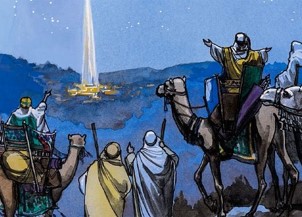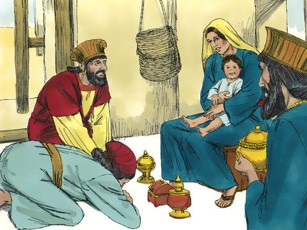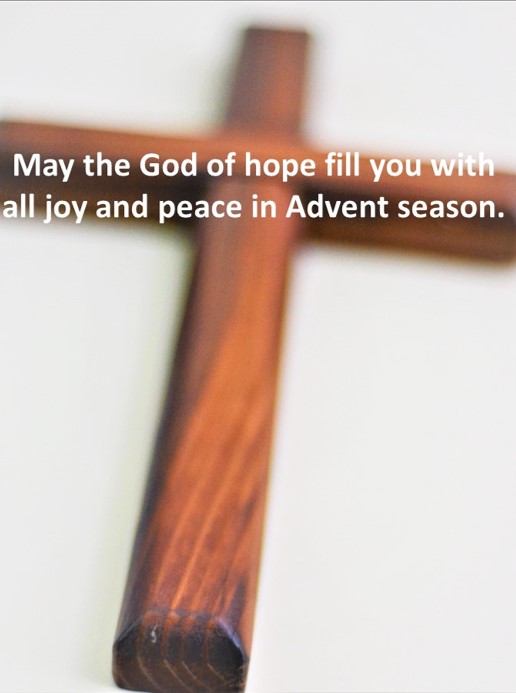Good morning in this blessed Advent season!
Greetings in the name of the Father, the Son, and the Holy Spirit.
For to us a child is born, to us a son is given, and the government will be on his shoulders. And he will be called Wonderful Counselor, Mighty God, Everlasting Father, Prince of Peace. (Isaiah 9:6)

As we are here on this first Sunday of Advent, we embark on a journey of anticipation and reflection. Advent, a season of waiting, invites us to ponder the profound theme of Hope. It’s a hope that is deeply rooted in the promises of God, a hope that has been a guiding light through the ages, from the prophets of the Old Testament to our lives today.
In the heart of this hope is the promise of the Messiah, a promise that spans the breadth of Scripture, echoing from the prophecies of Isaiah to the humble birth in Bethlehem. It’s a hope that was not just for a nation but for all humanity, a beacon in times of darkness, guiding us towards the light of Christ.
As we delve into the Scriptures, we are reminded of the yearning of the prophets who spoke of the coming of a great King, a Savior who would bring peace and justice. These prophecies were not mere words; they were the embodiment of a deep-seated hope that sustained generations. Today, as we reflect on these prophetic words, we are invited to rekindle this ancient hope in our hearts, to anchor ourselves in the promise of the Messiah who has come and is yet to come again.
Today, we will explore three pivotal aspects of this hope: its foundation in the promises of God, its fulfillment in Jesus Christ, and its ongoing significance in our lives.

The Foundation of Hope – The Promises of God
At the heart of Advent lies the foundation of hope, a hope deeply rooted in the promises of God as revealed through the prophets. Amidst the turmoil and uncertainty of their times, the prophets were beacons of light, carrying messages of hope that transcended their immediate circumstances and reached into the future, even to our present day.
Isaiah’s prophecy, as stated in Isaiah 9:6-7, is one of the most poignant. He speaks of a child, destined to bear the government upon His shoulders, known by the magnificent titles of Wonderful Counselor, Mighty God, Everlasting Father, Prince of Peace. This child, foretold by Isaiah, was to embody the hopes and expectations of a nation. His reign would be marked by justice and righteousness, from that time on and forevermore. The imagery used by Isaiah is rich and evocative, painting a picture of a leader who would bring about an era of peace and prosperity, a stark contrast to the strife and oppression of the times.
Similarly, the prophet Micah, in Micah 5:2, foretells the birth of a ruler in Bethlehem, one who would come forth to be the shepherd of Israel, ruling with the strength of the Lord. This prophecy is notable for its specificity, pointing to Bethlehem as the birthplace of this promised ruler, a detail that beautifully ties into the narrative of Jesus’ birth in the New Testament.
“But you, Bethlehem Ephrathah,
though you are small among the clans of Judah,
out of you will come for me
one who will be ruler over Israel,
whose origins are from of old,
from ancient times.” (Micah 5:2)
These promises were not mere words to provide temporary comfort. They were the foundation of a hope that was both enduring and transformative. This hope was not a passive waiting but an active anticipation of God’s redemptive action in history. It was a hope that sustained the people of God through centuries of waiting, through periods of exile, conquest, and oppression.
The fulfillment of these promises in the birth of Jesus Christ is a testament to God’s faithfulness. In Luke 1:54-55, Mary, the mother of Jesus, sings of this faithfulness, acknowledging how God has helped His servant Israel, remembering to be merciful, as He promised to our ancestors, to Abraham, and his descendants forever. This song, often called the Magnificat, echoes the deep-seated hope rooted in the promises of God.
He has helped his servant Israel,
remembering to be merciful
to Abraham and his descendants forever,
just as he promised our ancestors.” (Luke 1:54-55)
As we reflect on these ancient words of Isaiah and Micah, we see a clear pattern of God’s unwavering faithfulness. He does not abandon His people but provides a hope that endures through all generations. These promises assure us that God is actively at work in history, orchestrating His divine plan for salvation.
2 Peter 1:19 further affirms this hope, reminding us that we have the prophetic message as something completely reliable, and we do well to pay attention to it, as to a light shining in a dark place, until the day dawns and the morning star rises in our hearts. This passage encourages us to hold fast to the prophetic promises of God, for they are like a light shining in darkness, guiding us towards the dawn of a new day.
We also have the prophetic message as something completely reliable, and you will do well to pay attention to it, as to a light shining in a dark place, until the day dawns and the morning star rises in your hearts. (2 Peter 1:19)
In this Advent season, as we ponder the foundation of our hope, let us cling to the promises of God. Let these ancient prophecies renew our sense of anticipation and expectation, reminding us that in God’s perfect timing, every promise He has made will be fulfilled. Our hope in God is not in vain; it is as steadfast and sure as His word.

The Fulfillment of Hope – The Birth of Jesus
The advent of Jesus Christ into the world marks the culmination of a divine narrative that spans centuries – the fulfillment of a long-cherished hope. The Messiah, whose coming was foretold by prophets, entered our realm in the humblest of settings, a moment captured with poignant clarity in the Gospels. This event transcends historical significance; it embodies a living hope for all humanity.
In Jesus, the prophecies of Isaiah and Micah found their tangible realization. He was the Wonderful Counselor, imparting wisdom not as the world knows but divine, profound, and life-altering. His teachings, parables, and life lessons, as documented in the Gospels, offer guidance and illumination. In Matthew 5:1-12, the Beatitudes reveal a depth of spiritual insight and blessedness in a way that only the Wonderful Counselor could articulate.
As the Mighty God, Jesus exhibited divine power and authority. Miracles of healing, as in Luke 7:22 where Jesus recounts to John’s disciples the blind receiving sight, the lame walking, and the lepers being cleansed, attest to this truth. These acts were not mere displays of power but signs pointing to the reality of the kingdom of God breaking into the world.
So he replied to the messengers, “Go back and report to John what you have seen and heard: The blind receive sight, the lame walk, those who have leprosy[a] are cleansed, the deaf hear, the dead are raised, and the good news is proclaimed to the poor. (Luke 7:22)
Jesus, the Everlasting Father, manifested the depth of God’s love through His life and actions. His parable of the Prodigal Son in Luke 15:11-32 beautifully encapsulates this, portraying a father’s unconditional love and forgiveness. This story is a powerful representation of God’s enduring love for humanity, a love that seeks and welcomes the lost.
As the Prince of Peace, Jesus brought reconciliation between God and humanity. His teachings on love, forgiveness, and peace, as echoed in John 14:27 where He says, “Peace I leave with you; my peace I give to you,” offer a peace that transcends human understanding, a peace that is rooted in reconciliation with God and with one another.
The nativity of Jesus, described in Luke 2:7, marks the dawn of a new era, an era where hope is no longer a distant promise but a present reality. In this humble birth, the hopes and fears of all the years were met in Bethlehem that night. The birth of Jesus is a pivotal moment in history, a moment where God’s plan for salvation took on flesh and dwelt among us (John 1:14).
and she gave birth to her firstborn, a son. She wrapped him in cloths and placed him in a manger, because there was no guest room available for them. (Luke 2:7)
The Word became flesh and made his dwelling among us. We have seen his glory, the glory of the one and only Son, who came from the Father, full of grace and truth. (John 1:14)
This event, however, is more than just a historical milestone; it is a living reality that continues to inspire and ignite hope in the hearts of believers today. The birth of Christ signifies God’s nearness, His involvement in our lives, and His relentless pursuit of a relationship with us. In Romans 15:12-13, Paul speaks of this hope, saying, “The root of Jesse will spring up, one who will arise to rule over the nations; in him the Gentiles will hope.” Paul emphasizes that this hope is not just for Israel but for all nations.
The fulfillment of hope in Jesus’ birth is not confined to the past; it permeates our present and shapes our future. As believers, we are invited to embrace this hope, to let it transform us from within, and to carry it forward. In 1 Peter 1:3, Peter praises God for giving us new birth into a living hope through the resurrection of Jesus Christ from the dead. This living hope is our inheritance, imperishable, undefiled, and unfading.
Praise be to the God and Father of our Lord Jesus Christ! In his great mercy he has given us new birth into a living hope through the resurrection of Jesus Christ from the dead, (1 Peter 1:3)
In conclusion, the birth of Jesus Christ is the fulfillment of a hope that is both ancient and ever-new. It invites us into a story of divine love and redemption, offering us a hope that is as real and present as it was to the shepherds on that first Christmas night. As we continue in this season of Advent, let us hold fast to this hope, letting it guide our steps and fill our hearts with joy and peace.
The Ongoing Significance of Hope – Living in the Light of Christ
The hope inaugurated through God’s promises and brought to fulfillment in Jesus Christ is far from being just a chapter in history. It is a vibrant, living reality, holding profound significance in our lives today. In a world rife with despair and uncertainty, the hope of Christ serves as an unwavering anchor for our souls, grounding us in truth and promise.
Living in the light of Christ entails allowing the hope that emanates from His birth, life, death, and resurrection to profoundly shape our everyday existence. This hope is not abstract or theoretical; it is practical and applicable, touching every aspect of our lives. In moments of trouble, it offers strength; amidst chaos, it provides peace; and in the grip of despair, it brings joy. This is beautifully encapsulated in Romans 15:13, where Paul expresses a prayerful wish: “May the God of hope fill you with all joy and peace as you trust in Him, so that you may overflow with hope by the power of the Holy Spirit.”
Living this hope means embodying the values that Christ taught and demonstrated. It’s about cultivating a life of faith, rooted in the teachings of Jesus, and consistently trusting in God’s promises. As believers, we’re invited to actualize the reality of God’s kingdom in our present world. This involves more than mere adherence to religious practices; it’s about transforming our worldview and interactions to align with the principles of God’s kingdom. As Jesus taught in the Sermon on the Mount, in Matthew 5-7, the kingdom values include love for one’s enemies, acts of mercy, righteousness, and a pursuit of peace.
Our role as bearers of Christ’s hope is both a privilege and a responsibility. We are called to manifest this hope through our actions, words, and attitudes, becoming visible representations of Christ’s love and grace in the world. In 2 Corinthians 3:3, Paul describes believers as letters from Christ, known and read by everyone, indicating how our lives can reflect the hope and truth of the Gospel.
You show that you are a letter from Christ, the result of our ministry, written not with ink but with the Spirit of the living God, not on tablets of stone but on tablets of human hearts. (2 Corinthians 3:3)
This call to embody hope extends to acts of love, mercy, and justice. In a world where injustice, suffering, and pain are prevalent, followers of Christ are to be agents of change, bringing the light of hope into dark places. As stated in Micah 6:8, God has shown us what is good, and what He requires of us: to act justly, to love mercy, and to walk humbly with our God. This verse underscores the call to live out our faith in practical, tangible ways that reflect God’s character.
He has shown you, O mortal, what is good.
And what does the Lord require of you?
To act justly and to love mercy
and to walk humbly with your God. (Micah 6:8)
Moreover, the hope we carry is not only for our benefit but is meant to be shared. We are entrusted with the message of hope, called to spread it far and wide, as Jesus commissioned in Matthew 28:19-20. By doing so, we participate in the wider work of God, bringing His light and hope to those who have yet to experience it.
Therefore go and make disciples of all nations, baptizing them in the name of the Father and of the Son and of the Holy Spirit, and teaching them to obey everything I have commanded you. And surely I am with you always, to the very end of the age. (Matthew 28:19-20)
As we journey through Advent and beyond, let us embrace the ongoing significance of this hope. Let us allow the light of Christ to illuminate our paths and guide our steps. In doing so, we become beacons of hope in our communities and beyond, reflecting the transformative power of Christ’s love and grace.
In summary, the hope that started with a promise and was fulfilled in Jesus Christ is a living reality that continually shapes our lives. It empowers us to face challenges with courage, to live with integrity and compassion, and to be active participants in God’s redemptive work in the world. As we live in the light of Christ, let our lives be a testament to the enduring hope that we have in Him, a hope that is as relevant today as it was over two thousand years ago.
Summary and Life Application
As we conclude, let us remember that the Advent season is a time to anchor ourselves in the hope that is found in Christ. This hope, rooted in the promises of God and fulfilled in Jesus, calls us to live in a way that reflects the light of Christ to those around us.
In this coming week, let us meditate on the hope that we have in Christ. Let us find ways to demonstrate this hope in our interactions with others, in our service to those in need, and in our personal times of prayer and reflection. May we be a people who not only celebrate the birth of Christ but also live out the reality of His presence in our lives.
As we light the first candle of Advent, the candle of Hope, let us pray for the grace to embrace this hope more fully and to share it with the world. May our lives be a testament to the enduring hope that we have in Jesus Christ, our Lord and Savior. Amen.

“May the God of hope fill you with all joy and peace as you trust in Him, so that you may overflow with hope by the power of the Holy Spirit.” (Romans 15:13)
